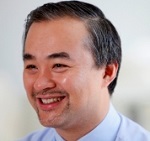 |
| Steve Yang, head of AstraZeneca's Asia and emerging markets innovative medicines group |
In the midst of rethinking its approach to R&D, AstraZeneca ($AZN) has dabbled in the virtual model of drug development, matching a small in-house staff with collaborators and contractors around the globe to make the process more efficient. Now, after some early success in neuroscience, the pharma giant is amping up its virtual efforts in oncology, signing a deal with a South Korean institution to hunt for new targets in the field.
Under the agreement, the government-funded Korea Health Industry Development Institute will work with AstraZeneca's virtual Oncology iMed division to identify early-stage translational projects by Korean investigators, the company said. The two are asking researchers to submit their proposals for review, and iMed plans to pick and fund the most promising 12, providing proprietary compounds for preclinical testing and collaborating with investigators through its virtual platform.
AstraZeneca launched iMed in 2012 with an initial focus on neuroscience, a high-stakes field that had long bedeviled the company. After cutting about 2,200 R&D jobs early that year, the drugmaker heralded iMed and its hyper-efficient structure as the way forward for its efforts in the space, and extending the virtual model to oncology dovetails with AstraZeneca's move to a more collaborative approach to research, said Steve Yang, head of AstraZeneca's Asia and emerging markets innovative medicines group.
"Open innovation and collaboration is increasingly a way of life at AstraZeneca," Yang said in a statement. "We believe that bringing together the ideas of many will help tackle global health challenges and accelerate the delivery of valuable medicines to patients."
And that's precisely the thinking behind AstraZeneca's latest job-cutting, infrastructure-rending move: The company is in the throes of unloading another 1,600 jobs over the next few years as it abandons many of its far-flung R&D operations and consolidates in the biopharma hub of Cambridge, U.K. Under AstraZeneca's plan, it'll settle into a new $500 million campus by 2016, shouldering into a thriving biopharma ecosystem and making "a clear statement of intent about putting science at the heart of everything we do," Executive Vice President Mene Pangalos said last month.
- read the statement